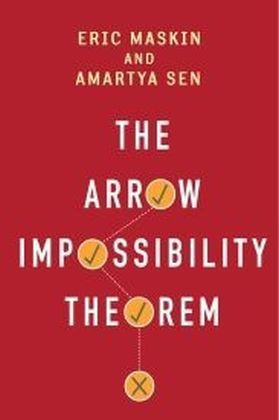Read more
Kenneth Arrow's pathbreaking impossibility theorem was a watershed in the history of welfare economics, voting theory, and collective choice, demonstrating that there is no voting rule that satisfies the four desirable axioms of decisiveness, consensus, nondictatorship, and independence. In this book, Amartya Sen and Eric Maskin explore the implications of Arrows theorem. Sen considers its ongoing utility, exploring the theorems value and limitations in relation to recent research on social reasoning, while Maskin discusses how to design a voting rule that gets us closer to the ideal - given that achieving the ideal is impossible. The volume also contains a contextual introduction by social choice scholar Prasanta K. Pattanaik and commentaries from Joseph E. Stiglitz and Kenneth Arrow himself, as well as essays by Sen and Maskin outlining the mathematical proof and framework behind their assertions.
List of contents
Acknowledgments
Introduction, by Prasanta K. Pattanaik
Part 1: The Lectures Opening Remarks, by Joseph E. Stiglitz
Arrow and the Impossibility Theorem, by Amartya Sen
The Arrow Impossibility Theorem: Where Do We Go From Here?, by Eric Maskin
Commentary, by Kenneth J. Arrow
Part II: Supplemental Materials The Informational Basis of Social Choice, by Amartya Sen
On The Robustness of Majority Rule, by Partha Dasgupta and Eric Maskin
The Origins of the Impossibility Theorem, by Kenneth J. Arrow
Notes on Contributors
About the author
Amartya Sen, geb. in Santiniketan, Indien, ist Professor in Harvard und war Master des Trinity College in Cambridge. 1998 erhielt er den Nobelpreis für Ökonomie und im November 2007 den Meister-Eckhart-Preis.
Joseph Stiglitz, geboren 1943 in den USA, war Professor für Volkswirtschaft in Yale, Princeton, Oxford und Stanford, bevor er 1993 zu einem Wirtschaftsberater der Clinton-Regierung wurde. Anschließend ging er als Chefvolkswirt zur Weltbank. 2001 wurde er mit dem Nobelpreis für Wirtschaft ausgezeichnet. Stiglitz lehrt heute an der Columbia University in New York und ist ein weltweit geschätzter Experte zu Fragen von Ökonomie, Politik und Gesellschaft. Er ist Autor mehrerer Bücher.
Summary
Kenneth J. Arrow's "impossibility theorem" was a watershed in welfare economics, voting theory, and collective choice. This book explores the implications of Arrow's theorem. Amartya Sen considers its value and limitations in relation to social reasoning, and Eric Maskin discusses how to design a voting rule that gets us closer to the ideal.
Report
"Without hyperbole, no postwar intellectual of the first rank has done more good for more people - above all, many of the world's poorest - than Amartya Sen." - Boyd Tonkin, The Independent

